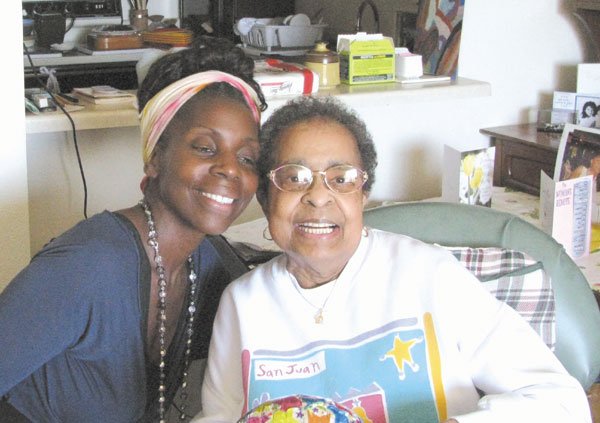I first met Norma Bandy when she moved to Gilroy from Detroit in
2005 to be near her grandchildren. The Gilroy community immediately
embraced her, and she became part of a close circle of friends who
treated her as if they had known her all their lives.
“Serendipity: an aptitude for making desirable discoveries by accident.”
– Dictionary.com
I first met Norma Bandy when she moved to Gilroy from Detroit in 2005 to be near her grandchildren. The Gilroy community immediately embraced her, and she became part of a close circle of friends who treated her as if they had known her all their lives.
She began attending a Wednesday morning group called “Serendipity.” The group of nine or 10 meet weekly and talk about whatever is going on in each others’ lives. They share their heartaches and challenges, as well as a lot of wisdom, storytelling and laughs together, while also reaching out to do good in the community.
The Serendipity ladies gradually learned Norma’s story of how she was born in St. Louis, Mo., and was orphaned by the age of 4. Her maternal grandparents took her to Tennessee to raise after her mother died from tuberculosis.
She loved going to the rural two-room school house where her grandmother taught. Her grandpa whom she called “Daddy,” was also a teacher. In the South in those days, white teachers were always paid first, while black teachers often had to wait for their pay, sometimes for more than a month.
“Sometimes my grandpa had to wait until summertime before he was paid,” she recalled.
“Imagination is a great thing. I never knew I was poor. Our street was adjacent to an affluent white neighborhood, and we played together,” she recalled, “One of my dearest friends lived there; we visited each others’ houses. We made pup tents out of gunnysacks and set them up on the vacant lot on our street. We had a grand time!”
Norma was already teaching high school during her senior year in college and earned her master’s degree at Western Michigan University. But her real love was early elementary education, where she saw the most need.
“I saw too many adults teaching who had no patience. I couldn’t believe how they were treating these children at such a formative time in their lives. It’s like a house; you need to lay a good foundation, or it will crumble.”
She and her husband Riley became very active in the NAACP at the state level. Her husband’s connections in the black community led to the opportunity to work with Thurgood Marshall, who would later become the first African-American appointed to the Supreme Court.
“Those were hard times,” she said of fighting for civil rights. “We had threats against our lives.”
It was challenging to be an African-American female teacher in a white classroom in the ’40s and ’50s, but Norma Bandy didn’t let restrictions and stereotypes of the time hold her back. She and her two team teachers (Mary and Maxine) in elementary teaching made an unstoppable trio.
One of the main ways the teachers coped was with humor. They clandestinely shared jokes among their colleagues. Maxine would have a joke that she would sneak in and leave on Mary’s desk when no one was looking. Then Mary passed it along to Norma’s desk, tucked inside a folder located under the lesson plan. The jokes traveled from school to school as well, thanks to the math coordinator for the district, who passed them along.
Retiring after nearly 40 years of teaching, Bandy enjoyed spending more time with her family. She continued to encourage and mentor every child she came into contact with. Two years ago, Bandy moved to Watsonville to be closer to her great grandchildren.
But she and the Serendipity group kept their connection going. They called each other, and for her 86th birthday in August, the group traveled over the hill to visit Bandy. They brought birthday lunch with them, and they gave her lovely orchid blooms, which delighted her.
“Two carloads of them showed up!” Norma exclaimed. “It meant so much to me.” In spite of struggling with severely crippling arthritis, Bandy took the time to write a painstaking thank-you note and sent it to Gilroy.
The pastor from Norma’s former church in Gilroy brought communion with him, and the whole group shared what was to be Norma’s last communion, holding hands and praying together.
She was one of those people who makes everyone feel better about themselves. I always left her presence feeling I could be more than I am. I have a message on my answering machine to me and my husband that I couldn’t bring myself to erase. It captures a bit of the warm personality of our dear Norma:
“Hello there my dear little family, Norma Bandy tryin’ to reach dear Kat. I just wanted to let you to know that you’re on my mind and in my prayers, both you and Steve. I hope everything is in divine order for the two of you.”
I got the news on Wednesday that Norma had passed away peacefully at her home.
I know that the way Norma lived her life, when she closed her eyes here for the final time, she opened them in heaven.
The funeral service for Bandy is at Mehl’s Colonial Chapel, 222 E. Lake Ave., Watsonville at 5 p.m. Saturday. Viewing is from 3 to 5 p.m. Saturday.












